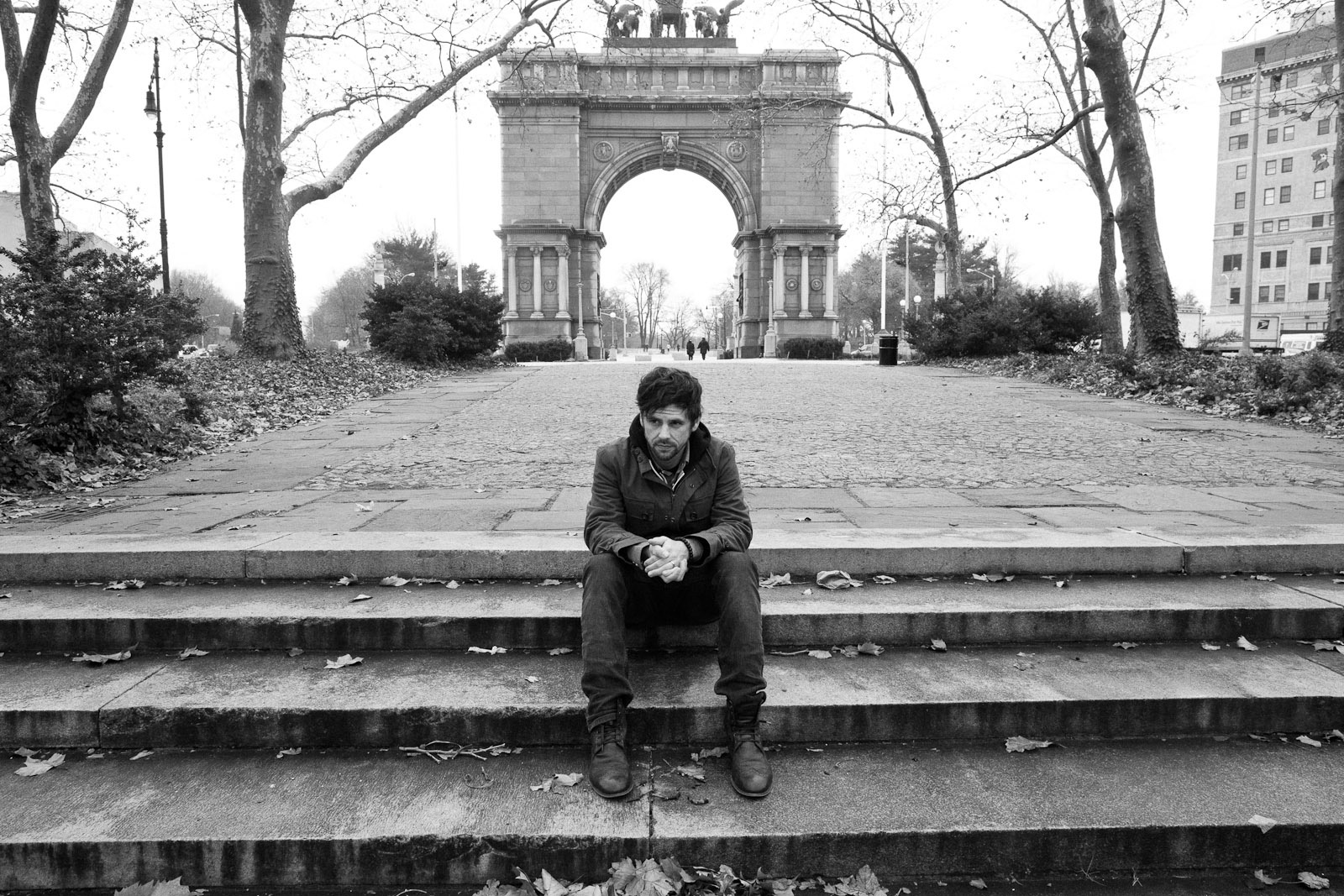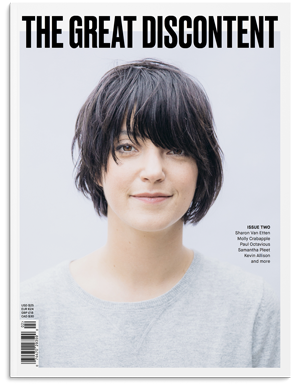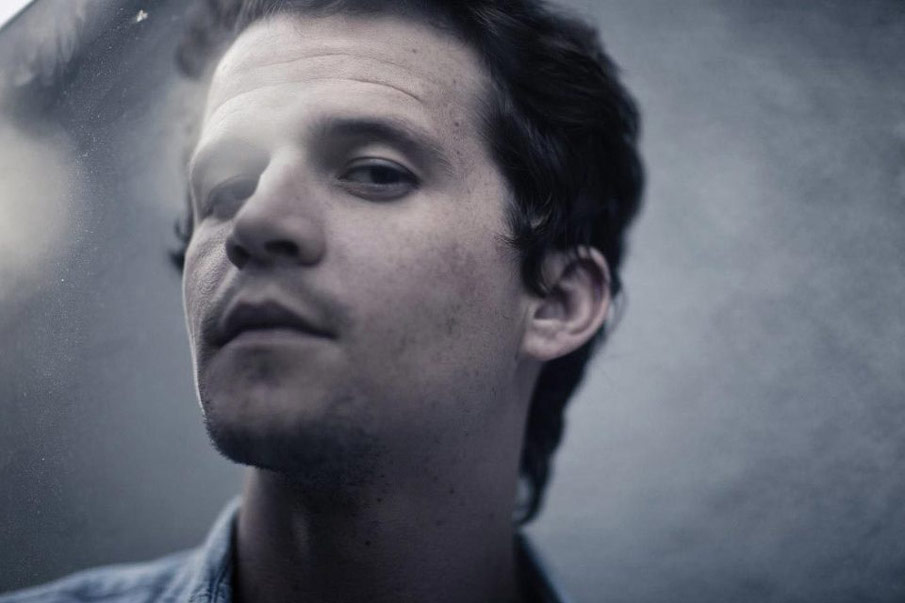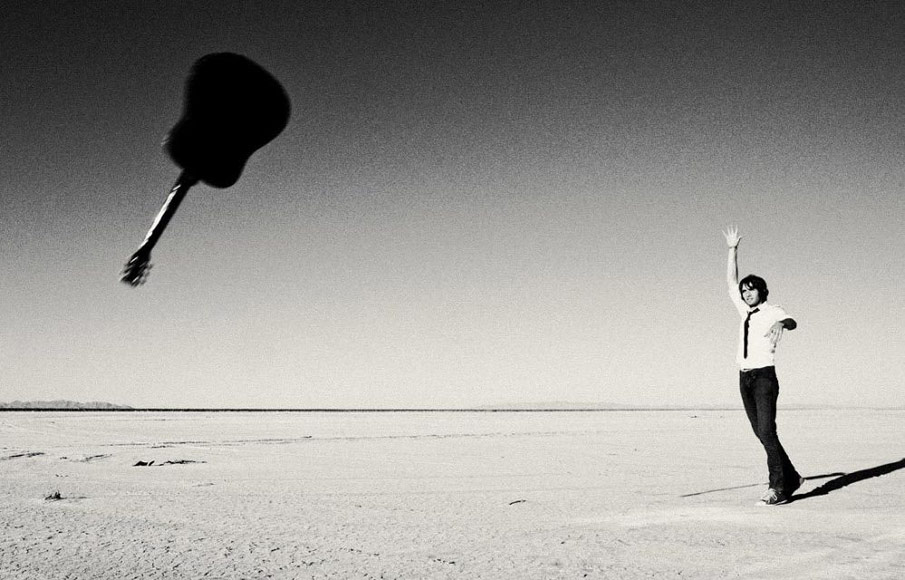
- Interview by Ryan & Tina Essmaker December 6, 2011
- Photo by Amy Parker Anderson
Eric Ryan Anderson
- photographer
Eric Ryan Anderson is a commercial photographer based in Brooklyn, New York, where he lives with his lovely wife, Amy.
Interview
 Editor’s note: An updated version of this interview, including new images and work, is featured in print in The Great Discontent, Issue Two, available in our online shop.
Editor’s note: An updated version of this interview, including new images and work, is featured in print in The Great Discontent, Issue Two, available in our online shop.
Describe your path to becoming a photographer.
Sure. My path was not the traditional one. I was born and raised in Texas and went to Texas A&M University to study architecture and business. After school, I worked in finance for three or four years before moving to New York.
I had always been into photography, but not as a craft. I was just “the dude with the camera”. My father bought me my first “nice” camera for my 24th birthday, which was unexpected and, to be honest, not even something I thought I wanted. I had just graduated and was living in Dallas at the time. I started going out after work and walking around downtown Dallas shooting the architecture. It was a creative outlet to balance out the day job and it just kept blossoming. Moving to New York really led me to be more reckless—in a good way—and I quickly decided that this was the time to pursue a different story. I quit my day job and dove in head first. That was five years ago.
Was it a long process making the transition from your day job to photography?
Yes and no. After realizing that photography was something I wanted to pursue, the day job quickly became a real drag. Luckily, I had saved some money before moving, so I was able to quit my job and spend about six to nine months as an intern for two very different photographers here in the city. Looking back, it wasn’t a particularly glamorous time in my life, but it was a vital experience to go through months of scraping by for rent and being so hungry to make images. After that, I spent about a year working as a photo assistant. I started shooting more and more and eventually the ratio grew to where I was able to shoot full-time.
What made you decide to do business to begin with as opposed to something more creative?
I initially went to Texas A&M to study architecture. My father is an architect and I was planning to graduate and work for him to eventually take over the family business. After a few years, I realized that architecture just wasn’t going to be my thing and decided I wanted to study to be a graphic designer. I had planted such roots at Texas A&M that I really didn’t want to leave. They didn’t have much in the world of art degrees, so I ended up switching over to business.
The business stuff has to come in handy now that you’re on your own.
Yeah, for sure. Sometimes I get emails from high school students asking for advice on how to become a photographer, what art school they should go to, etcetera. I still feel very unqualified to answer these emails, but generally try to express that while there’s nothing wrong with art school, having a business background has been more useful than I could have imagined. I have many friends here that went to photography school and they’re probably much better photographers than I am, but I found that learning the business and marketing part of it was really helpful for me. It cultivated an entrepreneurial spirit in me that may have otherwise gone unused.
Was creativity a part of your childhood?
Definitely. I was always a closet art nerd. I wanted to be an animator for Disney, an architect, a designer—I even tried to learn how to make holograms with my cousin for a hot second. (laughing) It feels natural to be working and living in the creative world now, even if I took a slightly different path.
I was always super encouraged by my parents to be creative and pursue art, which was crucial.
Have you had an “aha” moment when you knew photography was what you really wanted to do?
I think I’ve had a few of those. One was when I was living in Dallas and still working in finance. I was starting to dive into taking photos and, like a million other photographers, I emailed Jeremy Cowart. It just so happened that he was in Dallas for a photo shoot the next day and needed a third assistant. Despite my extreme lack of experience or knowledge (and the fact I couldn’t be there the first few hours!), he brought me on board for what was his first big commercial gig. I was so inexperienced and I felt guilty even invoicing anyone for the shoot, which I never did do!
Even if I was just holding a light stand or two, it was extremely eye-opening to be on that set. I had never considered the idea of photography being a profession. I honestly feel like that day started a chain of events that led me to where I am today.
Did you go to NY with photography in mind or did you move there for your day job?
I totally went with photography in mind. Despite a newfound streak of risk-taking, I still couldn’t move to NY without a plan. I was able to find and secure the finance job as a safety net, which I needed to get me up here and ensure my family and friends that I wasn’t crazy.
I had a couple months in cold, dark Manhattan with no friends and a job I hated. It really enabled me to do a lot of soul-searching; I kept coming back to the idea of story and how important that was. I realized that this [finance] job was clearly not why I came to New York and knew I needed to take a leap and start a new story.
Are your family and friends supportive of what you do?
Absolutely. I had lived in Texas my whole life and all my family and friends were there. They could have discouraged me from moving, but they didn’t. That was pretty powerful. When you do something that feels like such a big risk, it’s good to know that if all else fails, you have this network of people back home. It’s good to have that in the back of your mind.
Looking back now, I realize that the risk wasn’t necessarily in the action of moving or changing careers—New York is different, but it isn’t such a scary place. I think it was more about confronting some things I had always believed about my life and breaking out of these pre-conceived ideas about who I was going to be. Realizing that I had freedom to pursue something that had never even been on my radar… that was pretty freeing.
Who has been the most encouraging over the years?
My family because they’ve always been 100% behind me. And my wife, because she knew the crazy uncertainties surrounding freelance life, and still wanted to spend her life with me.
Did you or do you have a mentor?
That’s an interesting question. I worked for a couple photographers who taught me about how to run a studio and the business side of it, but I’ve never had a go-to mentor, which is a regret. I don’t know if you can go shop for one. (laughing) I’ve just never found that person, but I would love to have that. If anyone’s out there—any well-experienced photographers looking for someone to mentor, call me.
We’ll make sure to put that in the TGD classifieds.
(all laughing)
This question goes along with your move to New York, but was there another point when you had to take a big risk to move forward?
The jump to NY is an obvious one for me. I was on a safe path up until that point. I lived a stone’s throw away from my family and went to school three hours south of Dallas. To come to NY and then quit my job felt pretty good in hindsight, although it was scary at the time.
As a freelancer, I don’t know what each month is going to look like or if we’re going to have shoots. Living in the city feels like a constant risk. It’s not the comfortable thing by any means, but I wouldn’t have it any other way.
How does where you live impact your creativity?
It does immensely. I don’t think you have to be in New York (or anywhere else) to make it, especially now with the internet. I see photographers all over America doing amazing projects. Living in Brooklyn is best for us and definitely keeps me on my toes, but I think that’s rooted in our community here and the visually stimulating environment we live in.
That said, being in New York and being surrounded by the best of the best in the photo world, you have to find the balance between being super inspired and motivated, and super jealous that other people are shooting huge campaigns and maybe you’re not getting those jobs yet.
New York City is constant stimulation. Being here does provide many opportunities. You meet people you wouldn’t meet elsewhere. You never know what the next week will bring or who you’re going to meet on the street and end up shooting next month. Living in NY is a huge part of my business, but I never want to be the guy claiming that it’s essential to live here to have a successful shooting career—that’s just not true.
So you didn’t know anyone when you moved to New York?
I basically had two friends from Texas and both worked in the investment banking world, which meant I saw very little of them. Other than that, I didn’t know people, which might have been a blessing in disguise because I had nothing to lose. I worked and worked and studied and worked. I didn’t have the distractions that come along with a good community, which turned out to be a good thing, at least for a short time. I’d spend Friday night studying photography books at Barnes & Noble rather than going out chasing girls—probably more healthy for a number of reasons.

Are you part of a creative community of people?
My core group of friends is super creative. I’m part of a great community. They’re not all in Brooklyn—some of my best friends are in Texas and we work together a lot. Bands I work with are all over. It’s so great in today’s world to feel super connected to people despite huge physical distances.
Our community in Brooklyn is stocked with creativity and talent. From art directors to wardrobe stylists to musicians to dance instructors. It’s been so fun having a consistent group of friends and being able to see their careers begin to blossom. Our friend, Dana Tanamachi, drew this amazing chalk lettering piece on our kitchen wall two years ago and this week we got the new West Elm catalogue that she did the cover for—it’s so fun to witness growth like that.
Do you feel a responsibility to contribute to something greater than yourself?
Yeah, I do. Sometimes it’s hard for me to picture what greater responsibility I can have doing what I do. Speaking strictly of creating images, I think we’re completely over-saturated and overstimulated with amazing images every day. Whether it’s through Instagram, Tumblr, Pinterest or something else, it’s hard for me to imagine making some iconic image that rises above all the ridiculously beautiful stuff out there.
I think the main chance to contribute to the greater good is in the relational aspect of this job—meeting new people every week and interacting with people from all over the world. The ability to go past the creation of the photos and develop a camaraderie with people, to treat them fairly, and to have a good time is important.
At the end of the day, we’re probably not changing the world with most of the images we’re making, but what we leave behind is the relationships. I think those relationships last longer than the typical life-span of an image these days and I feel really lucky to have the chance to cultivate relationships with so many different people.
Are you satisfied creatively and where do you see yourself in 5 to 10 years.
Never satisfied… not even close. Now, if you would have told me five years ago when I quit my day job that I’d be able to be doing what I’m doing now, I would have been over the moon. But, obviously, as I’m sure anyone who reads this will likely agree, you’re never fully satisfied. I spent much of this week re-working my portfolio and despite being happy with much of my work, I constantly struggle to fight the inner demons telling me it’s all junk.
So I’d say that I’m definitely not satisfied, but I’m very thankful. I don’t take for granted that I get to pay rent by taking photos. I’m really humbled. I feel lucky that I’ve been able to keep creating and I hope that will continue.
Ryan: Do you see yourself branching out into other creative ventures?
Absolutely. I’m still a hack designer sometimes. I enjoy that. I’ve been doing a lot of video and the first music video I directed just came out. That was a crazy experience and I hope to do more of that. Who knows where it could lead? The way technology continues to shape and change things, I think it’s hard to predict how we’ll digest media even in 5 years. Telling stories is the heart of it all—whether through still photographs or motion pictures. I want to tell the best stories I can with whatever technology throws our way.
If you could go back and do one thing differently, what would it be?
I think I would have been more patient with myself and spent more time learning when I jumped into photography. I was a terrible assistant and always wanted to do everything myself. I didn’t take time to watch someone else do it, which goes along with why I don’t have a mentor—I pushed them all away! If I could go back, I’d probably spend another year and try to work with some of my heroes who I really respect. I have some friends who are doing that now and I can see the benefit in it.
If you could give a piece of advice to another photographer starting out, what would you tell them?
I’ll be honest… I’m sometimes a bit worried by the sheer number of people in this industry. It’s a constant hustle just to stay afloat and I’m still not even working on the big projects. I feel like it’s important to stress shooting for oneself, not trying to be someone else, and doing it to tell a story. I’d never shy away from encouraging young creatives to do those things and chase those passions, but I also think it’s equally helpful not to shy away from the realities of the industry.
People told me I wouldn’t find a true style for five or ten years, if not a lifetime. It’s held true. Just when I think I have it where I want it, I look back and think it’s crap. I would stress patience and not paying too much attention to other people’s work. Shoot because you love it; shoot the stuff that resonates with you.
I try to shoot in a way that pleases me and hope to connect with art directors and photo editors who resonate with the same things. Those are the relationships that will be fruitful and the jobs that will turn out well.
What does a typical day look like for you?
No matter where I wake up, I’m a huge proponent of a good breakfast: some chicken sausage and egg whites with coffee and toast. We make sure we’re well-fed in the morning.
Though I’ve been working more steadily out of a separate studio lately, I do have a steadfast rule if working from home—always wear my shoes. You’d be amazed at the shift in mindset when you simply put on your shoes. So yeah, a good breakfast, then put on your shoes and you’re lined up for a good day.
Tina: Do you put in a typical 8 hour day?
I don’t know. I feel like if I work from home I end up writing emails, invoicing, accounting, catching lunch and then it’s already five o’clock. I work at night a lot. I’ll cook dinner and hang out with my wife. Sometimes I’ll work while she makes jewelry and blogs. It doesn’t feel like work. I don’t have a start or finish time. I love editing photos, creating photos, even working on the studio side of things, so I rarely feel like I’m working. It sounds super cheesy, but it’s true.
Ryan: Is your wife creative too?
She is! We got married last year, and she started this great lifestyle blog and makes really awesome jewelry. She’s blossomed creatively and we feed off of each other. For the shoot we did today, we used a lot of her jewelry and wardrobe. So, even though she was working at her office at the time, it felt like we were collaborating.
Current album on repeat?
Ryan Adams, the new M83, and few tracks from the upcoming Green River Ordinance record that we’re working on visuals for. I’m also hugely addicted to The Head and the Heart. You can’t listen to that record and not tap your foot.
Favorite movie or television show?
We’re about to finish Season 1 of Friday Night Lights and it’s our new favorite show. Especially being from Texas, I can say it’s pretty accurate.
Outside of that, I love all the cliche movies that so many other creative people like—Gondry films, Wes Anderson, and I loved Midnight in Paris, which is probably the last film I saw in the theater.
Favorite book or books?
I’ve mainly only read the Twilight series… just kidding. For some reason I’ve only read older books this year… lots of Hemingway. Just picked up Cannery Row by Steinbeck, which I’ve been urged to read by several close friends and so far so good. The Tender Bar is also an all-time favorite of mine.
Favorite food?
I told my wife you were going to ask me this. In our first year of marriage, we’ve developed a real love of cooking. Nothing exotic or high-brow, but regardless of what we make, we always find ourselves opting for these amazing big bowls rather than plates. It could be chicken & veggies, taco salad or fish & rice, but it always ends up in a bowl. Our friend Andrew Shepherd was staying with us recently and he started calling it “The Anderson Bowl”. So, my favorite food is definitely “The Anderson Bowl”, but it looks different every day and you have to come to Brooklyn to try it. (laughing)
That sounds good. Okay, one last deep question. What kind of legacy do you hope to leave?
I think this ties into one of the earlier questions about being part of something bigger than yourself. I’m not ever going to claim that the pictures I’m taking are going to change the world or that anyone 100 years from now is going to remember anything I’m creating. I love that I get to do this for a living and absolutely want to create the best images that resonate with people for years. But, at the end of the day, the relationships with the creative community around us, starting a family—that’s the kind of stuff that lasts. If I can have a child someday and encourage them to be creative and confident, that’s all I can ask for.
In the big scheme of things, the work will come and go, the trends will shift, there will be good years and down years, but investing in community and people is something that will prove worthwhile. I hope to keep that a priority, not just in theory, but also in practice.

“In the big scheme of things, the work will come and go, the trends will shift, there will be good years and down years, but investing in community and people is something that will prove worthwhile.”